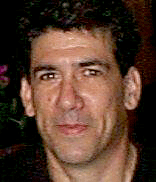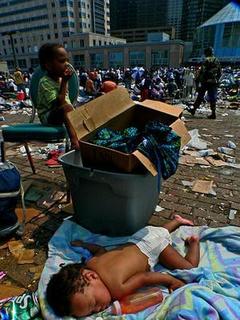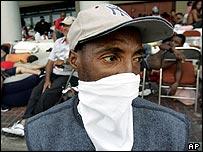 Special JPN Tribute by L.S. and S.A.M.
Special JPN Tribute by L.S. and S.A.M.It is with great sadness that the editors of
Jewish Peace News announce the passing of Dr. Amichai Kronfeld, 1947-2005, on September 1st, of cancer. Ami, who had been a contributor to
JPN since its inception in 2000 and became a regular editor in early 2002, was both a friend to many of us in Jewish Voice for Peace and a long-time, tremendously knowledgeable, and deeply committed activist on behalf of a just and peaceful resolution of the Israeli-Palestinian conflict. Ami was a teacher and model to all of us; with his clear thinking and sharp eye he never once strayed from the goal of our work: to use information and communication to build a thriving peace movement, and together to work to overturn the injustice and cruelty of occupation in Israel/Palestine. Among Ami’s great gifts was his ability to see straight through contradictions and hypocrisy and keep the focus on the urgency of the suffering and injustice at hand, while constantly challenging those around him—
JPN readers included—to question any assumptions or beliefs that justify the occupation.
In tribute to Ami, we are presenting
a collection of brief texts, including a reflection by Rela Mazali; personal reminiscences related by Zehavit Friedman, Diane Wolf, Noam Biale, and Sarah Levin; eulogies by Rachel Biale and Bluma Goldstein; excerpts from accounts of his final months by Chana Bloch; and a sampling of his own writings on Middle East peace and justice issues.
As you will see in the accompanying tributes and commentaries, Ami surrounded himself with loving family and friends, poetry and music, and the pursuit of peace and justice throughout his life. Ami began to develop his critique of Israeli government and society and his political disobedience as a young man fighting in Israel’s wars of 1967, the war of attrition and 1973. Serving in the Sinai desert in 1967, Ami received an order handed down by his commander in the Sinai, Ariel Sharon, to execute captured Egyptian soldiers. Ami refused the order. He fought in the 1973 war despite deep misgivings about the war's causes: he was aware that Israel had rejected an Egyptian peace offer in 1971. He was equally troubled at being sent to fight against the PLO, a group he viewed, against the Israeli party-line of that time, as the legitimate representative of a displaced and oppressed people. It was not until the birth of a political dissent movement among Israelis in the 1970s, and in particular the founding of the Israeli anti-war /anti-occupation organization, Yesh Gvul (“there is a limit”) in the 1980s, that Ami felt fully empowered as a peace and justice advocate.
Ami met and married Chana, his beloved wife of 30 years, in Tel Aviv, and in the mid-1970s immigrated with her to Berkeley, California, where she became a professor of Hebrew and comparative literature at UC Berkeley and he became a philosophy and computer science PhD. A researcher in Artificial Intelligence, he eventually returned to teaching college courses not only in philosophy and cognitive science but also on human rights and critical thinking. His goal as a teacher was to provide young people with tools for what he called “intellectual self-defense” against the state propaganda machine. Chana Kronfeld was Ami’s great collaborator in many of his endeavors and one of his great teachers, as he was hers. Their beloved daughter, Maya, was born in 1985. Ami, an avid musician (in Israel he’d performed with well-known artists such as Shimon Israeli and Chanan Yovel), had a special proclivity for jazz, and shared his love of music and ideas with his daughter. For a number of years they played together in a jazz quartet, the Lincoln Street Jazz Brigade, with Maya on piano or keyboard and Ami on drums. Maya has followed in her parents’ intellectual footsteps as well, recently declaring a double-major in philosophy (like her father) and comparative literature (like her mother) at UC-Berkeley, where she is an undergraduate.
In Berkeley, Ami was an important presence in the Mideast peace community. His life experiences gave him insight into the growing Israeli settlement project and the worsening conflict between Israeli Jews and Palestinian Arabs. Ami worked to promote and support organizations such as New Profile, an Israeli organization that challenged the militancy and patriarchal structures of that society, and Courage to Refuse, a movement of Israeli officers and soldiers who refused to serve in the Occupied Territories. He also became involved in the grass-roots peace and justice organization, Jewish Voice for Peace, and its sponsored news project,
Jewish Peace News. During these years, Ami helped to educate American Jewish activists who sought a just and peaceful resolution of the Israeli-Palestinian conflict.
Among Ami’s particular contributions to
Jewish Peace News was a series that he called the “Peace Index,” modeled on the provocative Harper's Index. Ami gathered and presented the bare and brutal statistics about victims of the violence during the Second Intifada in the Peace Index. He did this, he said, because he felt that, in addition to analytical commentary, it was important for readers of
JPN to remain aware of the most basic information about the lives and deaths of those suffering under the Israeli occupation. Ami also contributed his own writing to
JPN: an example is his commentary on the Courage to Refuse movement, appended below. Ami’s contributions were extremely well researched, and his voice was one of long experience, wisdom, and nuance.
During the final stages of Ami’s life, his friends gathered around Chana, Maya, and him to support this extraordinary family in their time of need. Chana Bloch, a longtime friend and co-translator with Chana Kronfeld of Hebrew poetry (together they published
Open Closed Open, Yehuda Amichai’s last book of poetry, in English, and they will soon publish
The Poetry of Dahlia Ravikovitch as well) wrote regular email reports about Ami’s condition. These reports, circulated among a large group of his friends, were not simply laments; they also sparkled with the richness of Ami’s interior life and his loving embrace of the world even as he was dying. The following are brief excerpts from some of the messages Chana Bloch sent to Ami’s circle in July and August:
7/12/05. [Ami] is walking with a cane because of numbness on his right side. He met with a physical therapist and acquired some coping skills that will help him be more steady on his feet. His mind is still sharp, as I can testify: two weeks ago he worked with Chana and me on some of our translations, drumming out for us subtle variations in rhythm and discovering a crucial literary allusion that both of us missed.
7/26/05. And here is a story to marvel at (I hope I’m telling this right): Two days ago Ami and Maya talked about the music they both love, and Ami beat out the rhythm of one of their jazz songs. “See?” he said. “I can trick the tumor.”
8/22/05. Yesterday brought the terrible news about the suicide of Dahlia Ravikovitch, the poet Ami has been helping us translate. We had asked her if we could dedicate The Poetry of Dahlia Ravikovitch to Ami's memory because his help has been so instrumental; in her last message to us Dahlia readily agreed, and Ami took pleasure in the thought. That was just a month ago, though it seems much longer.
8/25/05. Ami is having a lot of trouble sleeping, despite the morphine; the doctor called it “terminal phase restlessness.” Each day he is more paralyzed, more helpless. Technically he's “not in pain.” Just in agony. And yet: he managed to sit in the wheelchair to admire the garden, especially a six-foot high sunflower that has been growing wildly. “The garden is performing for him,” said Chana. The gardener planted some trees and shrubs that Ami had chosen, including an apricot tree, which reminded him of Israel.
As Ami lay dying, the politics of the Middle East and the urgent need for justice were still much on his mind. After Ami died, his aunt, Tikva Honig-Parnass, who came from Israel to help care for Ami in the last six weeks of his life, told Chana Bloch that “despite his great difficulty in speaking, he continued to be passionately engaged in political issues, talking about 1948, 1967, the disengagement, the Occupation, the situation of the Palestinians. He had an unswerving commitment to justice.” Chana Bloch continued: “Politics was as much at the core of his being as music and poetry.”
The many friends of the Kronfelds arranged to deliver meals for the family during the final weeks of Ami’s life, and they contributed to a fund to help pay for Ami’s home-care in the terminal phase of his illness. They visited Ami in the hospital and at home, whenever he was up to receiving visitors. Despite the deep sorrow it evoked and continues to evoke for so many of us, Ami's dying became the occasion for an extraordinary outpouring of love and support from the tightly knit community of his friends and family.
Ami Kronfeld will be missed by all of us in Jewish Voice for Peace and
Jewish Peace News, and his loss is felt intensely by his loving and beloved friends and family. His family requests that donations in his memory be sent to
Jewish Voice for Peace.
Amichai, your memory serves as a blessing upon us all, and your example gives us hope for the day when the world’s swords shall finally be beaten into ploughshares.
—S.A.M. and L.S., for
Jewish Peace News





